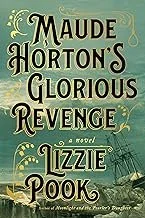Maude Horton's Glorious Revenge by Lizzie Pook
/Maude Horton’s Glorious Revenge
By Lizzie Pook
Simon & Schuster 2024
“How can society arrive at a position where it believes that the only solution for wickedness and suffering is to enact exactly that on others?” This is the question at the heart of Maude Horton’s Glorious Revenge, the new historical fiction novel by author Lizzie Pook.
This book tells the story of a young woman named Maude who is determined to find out what happened to her sister. Maude’s sister Constance assumed the identity of a ship’s boy and joined the crew of the Makepeace looking for adventure. The ship left England on a mission to look for survivors of the Franklin expedition—the doomed expedition to find a way through the Northwest Passage, famously fictionalized in The Terror by Dan Simmons. But when the Makepeace returns to port without Constance aboard, Maude becomes determined to uncover the truth. As the story unfolds and Maude learns what happened to her sister, she decides to get revenge on those responsible.
Set in the mid-1800s in both London and the Arctic, Maude Horton’s Glorious Revenge is meticulously researched historical fiction. This isn’t the variety of historical fiction where history is only window-dressing; this is fiction infused with history. The detail with which Lizzie Pook constructs her world brings it to life in an engaging way, while creating a suffocating, claustrophobic atmosphere. An atmosphere that is equally effective in both London and on the Makepeace.
There was a burgeoning public interest in true crime in Britain during this time period and public hangings were the order of the day. Attended by crowds of people, including more than a few looking to make a profit from the spectacle, onlookers were eager to see this barbaric form of justice done. At one such event early in the novel the crowd is described as an overwhelming mass, “Below the scaffold, and for as far as the eye can see, are humans, crammed in and seething, writhing, rippling like a bucket of putrefied meat. Humans have squashed themselves into every space imaginable, scrambling onto the rooftops, clinging to porticos and swinging from railings.” It is as if the people who attend these events are nothing more than insects; carcass-devouring maggots looking to get a piece of the pie before it’s eaten all up. The feeling of claustrophobia and the fear of getting caught in a crush is almost palpable.
At sea, it is often not possible or safe to disembark from the Makepeace, so the sailors and Constance find themselves ship-bound for long stretches of time, slowly getting more and more restless and developing a growing sense of paranoia and isolation. Experiencing their own, “tales of madness,” which Constance describes in her dairy as, “stories of men sent the way of lunatics by debility, men who become lost in their own loneliness and desperation. Never to find their way back.”
The fog covered, gas-lit streets of London in the early morning on the way to witness an execution. The push and pull of the crowds awaiting the execution of the convicted. The utter desolation and beauty of the Arctic. These two settings, Victorian London and the Arctic, work together to create a palpable world full of oppression, claustrophobia, and isolation. Feelings that only grow as the novel progresses and Maude gets closer to her goal.
These themes are also reflected in the characters themselves. The characters on the Makepeace experience increased isolation and paranoia as their voyage continues. Particularly Constance who has the added stressor of keeping her identity secret from the rest of the crew as women were not allowed on ships like this at this time. It’s easy to see how this would lead to increased anxiety. Coupled with the inherent isolation of a voyage through the Arctic, it’s a recipe for disaster. Lizzie Pook captures the changing mental states of the characters on board the Makepeace with skill and precision.
Back in London a similar story unfolds as Maude becomes more entrenched in the mystery of her sister’s disappearance. Her determination to learn the truth begins to morph into obsession and paranoia as her investigation starts to bear fruit. The intertwining of these storylines focused on paranoia, isolation, and desperation with the oppressive settings both of Victorian London and the Arctic forms a truly cohesive whole.
Maude Horton’s Glorious Revenge is an impeccably researched piece of historical fiction. It is both a propulsive adventure story and a thought-provoking and engaging meditation on the nature of revenge.
Amberlee Venters is a freelance editor and writer living in Northern California.
